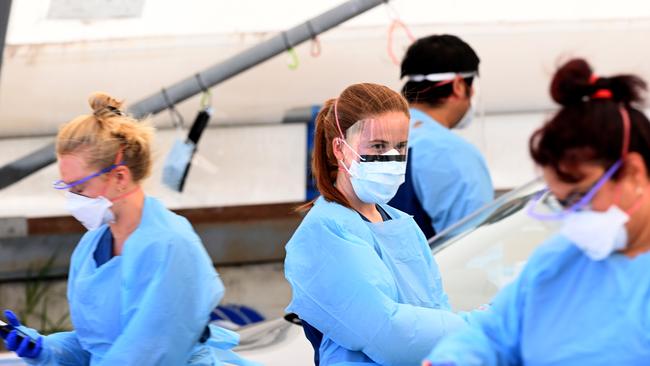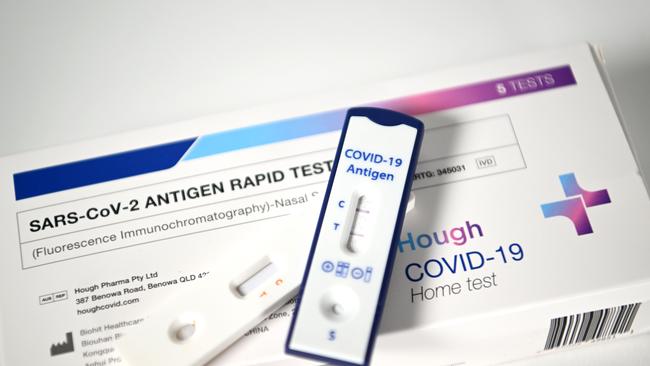Department of Health clarifies Australia’s Covid-19 plan amid backlash
The Department of Health has clarified its plan to handle Covid-19 in Australia amid backlash over an apparent decision over PCR tests.
NewsWire
Don't miss out on the headlines from NewsWire. Followed categories will be added to My News.
The Department of Health has clarified its plan to handle Covid-19 in Australia amid backlash over an apparent decision to cut the funding agreement between the states and the Commonwealth.
“PCR tests remain free for everyone who needs them. Priority populations can access them free through state testing sites and GP-led respiratory clinics,” a note from the department read.
“And anyone whose GP or nurse practitioner requests a PCR test for them [from a pathology clinic] will be bulk billed.”
Australian medical professionals slammed the federal government’s plan earlier on Monday after it appeared PCR tests would not be made available without a referral.
Health Minister Mark Butler released the national Covid health management plan on Monday, with changes to the way the country’s health services deal with the virus as cases once again surge.
Over 2023, Australia will transition to managing Covid-19 in a “similar way” to other respiratory viruses, moving away from bespoke arrangements, and PCR tests would be available with a doctor’s referral only, he said.
The changes to testing are intended to turn a PCR - which is more sensitive than a rapid test - from a surveillance tool to a means of getting those in need faster access to antiviral medication.
Mr Butler said the plan would ensure the country’s health system has the “capacity and capability” to respond to future waves and variants; promote uptake of vaccination and treatments; and slow the spread of transmission.
“This plan strikes the right balance, we’re confident, to protect vulnerable Australians, to protect the integrity of our health and hospital system while transitioning safely out of the emergency phase of the pandemic,” Mr Butler said.
But the Australian Medical Association is strongly urging an extension of Covid-19 funding to prevent putting further pressure on the health system.
AMA President Professor Steve Robson said the government’s announcement failed to extend a critical lifeline to public hospitals, with the 50-50 Covid-19 funding agreement between the states and the Commonwealth ending on 31 December 31.

Professor Robson said there was likely to be another surge in Covid cases from the fourth wave, and it was the “worst time” to pull funding.
“Covid-19 is not over, no matter how much the federal government wishes it was.
“It is a deadly and debilitating disease which is playing havoc with lives and the health system.
“Without this extra funding, the health system will fall even further down the rabbit hole.
“This is a bewildering decision by the government and goes against the advice of many experts including the AMA.”
The new national plan acknowledges the virus is likely to continue mutating, with an epidemiological oulook from Chief Medical Officer, Professor Paul Kelly, predicting there would be “new waves (of Covid-19) on a regular basis for at least the next two years”.
Professor Kelly said new variants were likely to emerge, including some that would be able to “partially evade immune responses”.
Professor Robson said it was essential a permanent funding agreement was put in place to prevent further strain on an already busy hospital system nationwide.
“In recent days we have seen stark evidence of the disastrous state of our public hospitals with the performance of emergency departments hitting record lows, and a reduction in the volume of elective surgeries performed because our hospitals are in logjam,” he said.
“We’ve also seen children waiting up to 12 hours for emergency care and patients dying while ramped at hospitals.
“It is further proof the existing hospital funding arrangements are flawed and have been neglected for many years.
“The federal government must not walk away from this crisis.”
A major change in the new plan announced by Mr Butler on Monday will see Australians require a referral to obtain a PCR test from January 1, in a major shift to the way the country deals with Covid-19.

The plan also seeks to take pressure off hospitals by ensuring people can seek community care in the first instance.
GP-led respiratory clinics will continue throughout summer, before they are stood down at the end of February – but will be reinstated should they be required.
Over 2023, Covid-19 testing requirements will be aligned with arrangements associated with other respiratory illnesses, Mr Butler said.
From January 1, a referral from a medical or nurse practitioner will be required for a Medicare-funded PCR.
Low risk individuals who test positive on a RAT are advised to stay home where possible and avoid high risk settings. Low-risk individuals who live or work with people who are high risk, particularly for Covid-19, can get a referral if their symptoms persist even after a negative RAT.
High risk individuals will be prioritised for PCR testing.
Those considered high risk under the new plan include older Australians, First Nations people, people with a disability, people from culturally and linguistically diverse communities, people living in remote communities, people with complex underlying health conditions, and the immunocompromised.
Access to antivirals will still be available to eligible people following a positive test – whether by RAT or PCR.

It comes as Covid-19 cases surge across the country, with NSW recording more than 40,000 new cases last week and 48 deaths with 1526 in hospital – 40 of whom are in intensive care.
Victoria averaged 682 daily hospitalisations and 28 daily intensive care admissions, and reported 27,790 new cases last week.
There were 15 deaths in the latest reporting period in Queensland, with 320 people in hospital with the virus.
Other key measures within the national plan include the vaccine program being extended through to December 2023, additional digital mental health services offered through to June next year, and support for aged care through to the end of next year.
The plan also stipulates the government will release a separate long-Covid strategy, to ensure the health system can support people who suffer from prolonged effects of the virus.
Originally published as Department of Health clarifies Australia’s Covid-19 plan amid backlash


